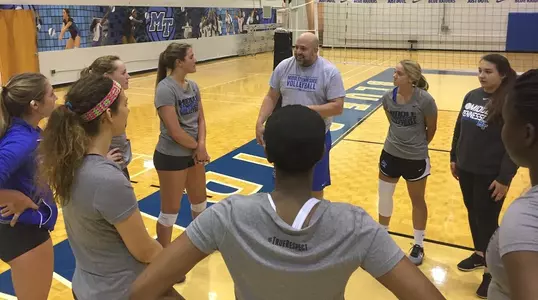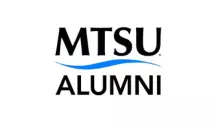Middle Tennessee State University Athletics

Get to know Blue Raiders' Chuck Crawford
1/30/2017 1:40:00 PM | Women's Volleyball
Chuck Crawford was named Middle Tennessee's 11th head volleyball coach in program history on Jan. 10, 2017.
Crawford was most previously an assistant for three years at Auburn, where he focused on defensive game planning along with scouting and assisting with recruiting and development. Prior to that, he spent a season at Georgia Tech, coaching the middle blockers while also serving as recruiting coordinator and director of camps.
He went to Georgia Tech from his alma mater Miami (Ohio), where he was an assistant for two years working primarily with the hitters. Crawford also oversaw the program's recruiting.
Before joining the RedHawks, Crawford spent a year and a half as assistant coach and recruiting coordinator at Jacksonville University and also was a volunteer assistant at Georgia Tech in 2009. He also has nearly 10 years' experience coaching at the high school level in Georgia's Fulton and Forsyth counties.
He is a member of the American Volleyball Coaches Association, having served on their national Assistant Coaches Committee, as well as United States Volleyball and the Southern Region Volleyball Association.
Crawford and his wife, Lori, have four children: Carson, Drew, Ty and Ava. An avid rock and mountain climber, Crawford was featured in the Weather Channel TV series Epic Conditions climbing the nose of El Cap (3,300 feet) in Yosemite. He has also summited 14,400-foot Mount Rainer in Washington and spent three years riding bulls in the Professional Rodeo Cowboy Association (PRCA).
We got the chance to sit down with the Blue Raiders' new coach to find out a little more about him and what he wants to bring to the program.
Why is MTSU the perfect fit for you?
The people. I'm a very relationship-driven person, so people matter first. John Wooden used to talk about when you hire people, when you work with people, make sure they are of good moral compass first. I interviewed two years ago and instantly fell in love with the people.
Also, I believe in this place. Every place I've coached at, I've with all my heart believed in what they were doing academically, athletically and what the town itself was doing. There are some people who want to be a head coach because they just want to be a head coach, and there are some people who want to be a head coach to be somewhere. I wanted this job. I want to be here.
What kind of coaching style do you have?
Number one, as a teacher it's all based in learning. I have super high intensity, but I take the time to look at a kid's learning style. The other thing is, the standard I hold is extremely high and I believe in being fair and consistent. Players nowadays really want structure and consistency, and if they don't have that they aren't going to do what you need them to do. You can be hard on them and you can still expect a lot, but if you teach them and explain the reason behind the "why," you're really teaching them. I believe those are the things a great coach does.
You've been here about two weeks – what are your and your family's impressions of the university and the city so far?
I didn't know anything about the town other than what some friends from other universities who had lived here told me. I heard amazing things about the town, the schools, the churches – those were huge things for our family. Now that I'm here, I've had some people walk up and say, "hey, aren't you the new coach?" and it's just nice to be in a community where they generally care about athletics and are supportive.
Do you have one set goal you want to accomplish most in your first season?
I think the biggest thing is establishing culture. When Middle Tennessee was going to the NCAA tournament year after year, the culture was established. That culture has to be re-established, and they have to understand what it means to be an elite-level program and how to compete against the top 25 or top 50 teams. If we accomplish culture and understand how to compete this year that would be a huge thing. If those two things happen, the wins and losses will happen automatically.
What will be your biggest challenges in your first year?
Just establishing that culture. When you go 5-24 and 8-22, they only know what losing feels like. They don't know what it means to get into a great battle against a worthy opponent and put them away. They have to understand and learn how to win again.
What is your next step in working with the team?
Building the relationships and making sure that we spend time together off the court. If our relationships are only based on what happens on the court, then it's not really a relationship. We're making sure we're spending time, whether it's getting coffee with the girls or grabbing lunch with them, and just talking life and not really talking anything about volleyball. That off the court relationship should spill over on the court.
You've never been a collegiate head coach. How will your past experiences help that learning curve?
I've had the fortune to coach some really high-level athletes. Having coached All-Americans technically and tactically, I definitely understand what that element looks like. Chris Catanach at the University of Tampa gave me some great advice one time. He said, "Whatever you did as an assistant coach to be successful, don't change that when you become a head coach." Assistants who jump to be head coaches sometimes think they're entitled or that they don't have to do the simple things that keep you humble. I just want to keep my humility, do the things that got me to this point, build relationships, be approachable. Those are the things, especially in the first year, that I want to make sure I do.
I also want to make sure my assistant coaches have autonomy in their areas. I'm not a micromanager. Two of my most important mentors taught me how to be a professional head coach, really how to take care of everybody from the custodians to the AD and how to show appreciation for what they do for the program.
What do you want the fans to know about you personally and the program you will run?
Personally, the most important things in my family's life are God, family and then education. We have four children – Carson, Drew, Ty and Ava – and if you ask them what our family priorities are, it's love God, be great academically and be great to people around you. They know those as well as their own names.
For the community and fans, practices are always open. Anyone can come by anytime. If any high school coaches or club coaches want to come in and talk volleyball, they're more than welcome to. We definitely plan to do some free clinics for the community members that we'll post later on. We're just trying to do our best to give back as a program and really be involved from a community service standpoint. We understand being a servant leader really needs to be a cornerstone of what we do.
You have a pretty diverse background with your rock and mountain climbing and professional bull riding. How did that start and would you consider yourself an adrenaline junkie?
I grew up playing a variety of sports. I was watching the movie "8 Seconds" about Lane Frost, and thought it was cool and I could do that. I rode in the PRCA, had a pro card for a couple of years, then when I was graduating college I was looking for the next thing to do. I started rock climbing, then when I moved to Atlanta the area is huge for rock climbing so I got into that there. I actually asked my wife to marry me on a ledge about 550 feet in the air. I was going for shock value, not romance!
They say there are three adrenaline-driven sports – riding bulls, rock climbing and NASCAR. The only one I have left is driving NASCAR, and I would love to go down to Talladega and do the driving experience.
Crawford was most previously an assistant for three years at Auburn, where he focused on defensive game planning along with scouting and assisting with recruiting and development. Prior to that, he spent a season at Georgia Tech, coaching the middle blockers while also serving as recruiting coordinator and director of camps.
He went to Georgia Tech from his alma mater Miami (Ohio), where he was an assistant for two years working primarily with the hitters. Crawford also oversaw the program's recruiting.
Before joining the RedHawks, Crawford spent a year and a half as assistant coach and recruiting coordinator at Jacksonville University and also was a volunteer assistant at Georgia Tech in 2009. He also has nearly 10 years' experience coaching at the high school level in Georgia's Fulton and Forsyth counties.
He is a member of the American Volleyball Coaches Association, having served on their national Assistant Coaches Committee, as well as United States Volleyball and the Southern Region Volleyball Association.
Crawford and his wife, Lori, have four children: Carson, Drew, Ty and Ava. An avid rock and mountain climber, Crawford was featured in the Weather Channel TV series Epic Conditions climbing the nose of El Cap (3,300 feet) in Yosemite. He has also summited 14,400-foot Mount Rainer in Washington and spent three years riding bulls in the Professional Rodeo Cowboy Association (PRCA).
We got the chance to sit down with the Blue Raiders' new coach to find out a little more about him and what he wants to bring to the program.
Why is MTSU the perfect fit for you?
The people. I'm a very relationship-driven person, so people matter first. John Wooden used to talk about when you hire people, when you work with people, make sure they are of good moral compass first. I interviewed two years ago and instantly fell in love with the people.
Also, I believe in this place. Every place I've coached at, I've with all my heart believed in what they were doing academically, athletically and what the town itself was doing. There are some people who want to be a head coach because they just want to be a head coach, and there are some people who want to be a head coach to be somewhere. I wanted this job. I want to be here.
What kind of coaching style do you have?
Number one, as a teacher it's all based in learning. I have super high intensity, but I take the time to look at a kid's learning style. The other thing is, the standard I hold is extremely high and I believe in being fair and consistent. Players nowadays really want structure and consistency, and if they don't have that they aren't going to do what you need them to do. You can be hard on them and you can still expect a lot, but if you teach them and explain the reason behind the "why," you're really teaching them. I believe those are the things a great coach does.
You've been here about two weeks – what are your and your family's impressions of the university and the city so far?
I didn't know anything about the town other than what some friends from other universities who had lived here told me. I heard amazing things about the town, the schools, the churches – those were huge things for our family. Now that I'm here, I've had some people walk up and say, "hey, aren't you the new coach?" and it's just nice to be in a community where they generally care about athletics and are supportive.
Do you have one set goal you want to accomplish most in your first season?
I think the biggest thing is establishing culture. When Middle Tennessee was going to the NCAA tournament year after year, the culture was established. That culture has to be re-established, and they have to understand what it means to be an elite-level program and how to compete against the top 25 or top 50 teams. If we accomplish culture and understand how to compete this year that would be a huge thing. If those two things happen, the wins and losses will happen automatically.
What will be your biggest challenges in your first year?
Just establishing that culture. When you go 5-24 and 8-22, they only know what losing feels like. They don't know what it means to get into a great battle against a worthy opponent and put them away. They have to understand and learn how to win again.
What is your next step in working with the team?
Building the relationships and making sure that we spend time together off the court. If our relationships are only based on what happens on the court, then it's not really a relationship. We're making sure we're spending time, whether it's getting coffee with the girls or grabbing lunch with them, and just talking life and not really talking anything about volleyball. That off the court relationship should spill over on the court.
You've never been a collegiate head coach. How will your past experiences help that learning curve?
I've had the fortune to coach some really high-level athletes. Having coached All-Americans technically and tactically, I definitely understand what that element looks like. Chris Catanach at the University of Tampa gave me some great advice one time. He said, "Whatever you did as an assistant coach to be successful, don't change that when you become a head coach." Assistants who jump to be head coaches sometimes think they're entitled or that they don't have to do the simple things that keep you humble. I just want to keep my humility, do the things that got me to this point, build relationships, be approachable. Those are the things, especially in the first year, that I want to make sure I do.
I also want to make sure my assistant coaches have autonomy in their areas. I'm not a micromanager. Two of my most important mentors taught me how to be a professional head coach, really how to take care of everybody from the custodians to the AD and how to show appreciation for what they do for the program.
What do you want the fans to know about you personally and the program you will run?
Personally, the most important things in my family's life are God, family and then education. We have four children – Carson, Drew, Ty and Ava – and if you ask them what our family priorities are, it's love God, be great academically and be great to people around you. They know those as well as their own names.
For the community and fans, practices are always open. Anyone can come by anytime. If any high school coaches or club coaches want to come in and talk volleyball, they're more than welcome to. We definitely plan to do some free clinics for the community members that we'll post later on. We're just trying to do our best to give back as a program and really be involved from a community service standpoint. We understand being a servant leader really needs to be a cornerstone of what we do.
You have a pretty diverse background with your rock and mountain climbing and professional bull riding. How did that start and would you consider yourself an adrenaline junkie?
I grew up playing a variety of sports. I was watching the movie "8 Seconds" about Lane Frost, and thought it was cool and I could do that. I rode in the PRCA, had a pro card for a couple of years, then when I was graduating college I was looking for the next thing to do. I started rock climbing, then when I moved to Atlanta the area is huge for rock climbing so I got into that there. I actually asked my wife to marry me on a ledge about 550 feet in the air. I was going for shock value, not romance!
They say there are three adrenaline-driven sports – riding bulls, rock climbing and NASCAR. The only one I have left is driving NASCAR, and I would love to go down to Talladega and do the driving experience.
MTSU Volleyball Recap 10/17-18/25
Tuesday, October 21
Middle Made Moments - MTSU Volleyball clean sweep - October 7th
Tuesday, October 07
MTSU Volleyball Recap 9/27-28/25
Monday, September 29
True Blue Testimonials - Caroline Macander MTSU Volleyball Setter - Presented by MMC
Tuesday, September 16













